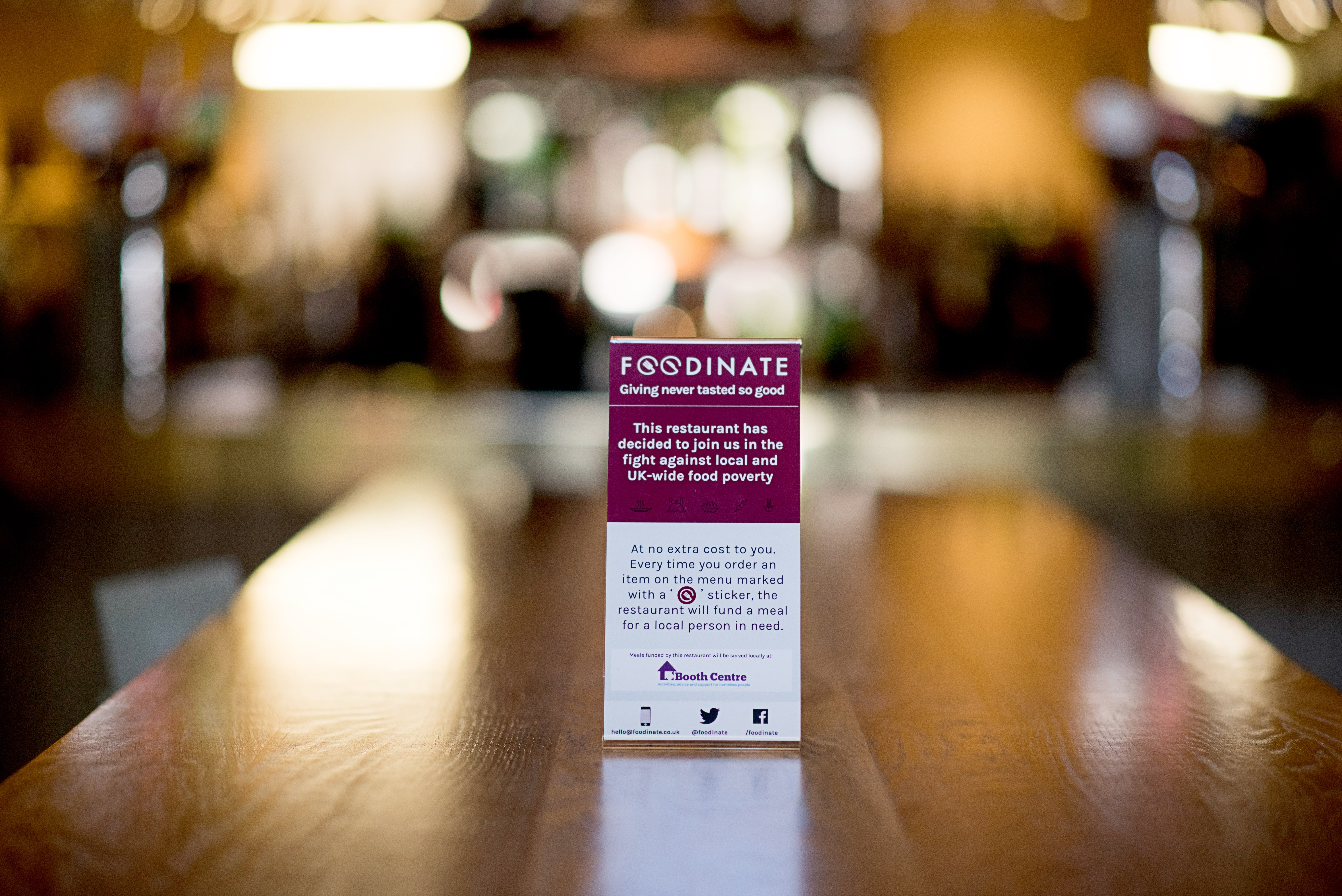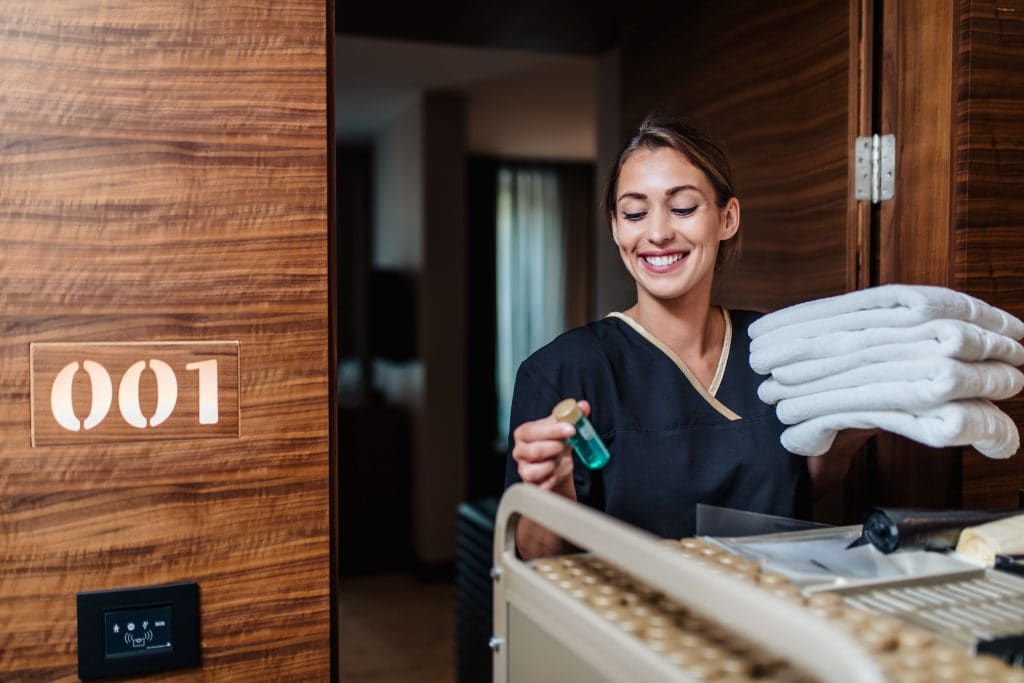
Caroline Stevenson piloted Foodinate, her idea for a socially responsible initiative, in October 2015. It works by partnering with restaurants, which agree to cover the cost of a meal to a local support centre for the vulnerable for every designated Foodinate-marked dish that they sell. Three and a half years on, it’s supporting 13 centres across 12 cities across the UK, and has reached a new milestone donation number.
What inspired you to start Foodinate?
Without wanting to sound clichéd, the fact that the UK is the seventh richest country in the world and yet so many people here go without food is something I’ve always wanted to act on.
I’ve had little businesses on the go since I was tiny. When I was four, my best friends and I would make up plays and charge our parents and their friends to come and see them. I received a distinction in Young Enterprise at 15 and set up a business at 18 to fund being at university in London. It’s probably fair to say I always had that side to me, and this project means I’m working on the thing I’m most passionate about.
Put it this way: we eat out approximately 1.4 bn times per year in the UK, and yet so many people in this country are going without food. There had to be a way of linking the two sides of the same coin that worked for everyone in a way that’s sustainable and could have a big impact.
Some restaurants suggest adding a donation onto the end of a bill for a charity drive. What sets Foodinate apart from that kind of charity scheme?
A big part of what makes Foodinate different is there’s no extra cost to the customer. As a restaurant, it means you’re not putting your customers on the spot, not asking them to do anything extra, or to take time out of their day. It just means that when they go out to eat as they normally would, they could choose you over a competitor, and choose to order a certain dish on the menu that’s marked with the Foodinate logo, and the restaurant then pays for a donated meal.
Donating a meal as a result of what you order means there’s a very tangible impact. I think that some charitable initiatives can sometimes lack a bit of clarity – it might not be completely obvious what will happen as a result of the money they’ve asked of the customer, even though the charity is doing great work.
With Foodinate, it’s very much a linear process. Eat this meal and someone in need will get a meal for free. Not only that, but it’s someone round the corner from you, as we always match our restaurants and beneficiaries by location. It makes the impact that bit more meaningful; for customers to know that it’s local.
How did you first approach restaurants to partner with Foodinate and persuade them to be part of the scheme?
I ran a pilot study to test my ideas for Foodinate. My background is in Psychology, and so in typical Psychology fashion I ran a pilot study to test my hypotheses. I wanted to see what made a difference to the impact we could generate, to the feedback we got from customers and to the benefits for potential business partners, including how a concept like Foodinate could sway consumer decision-making.
We found Foodinate actually works very well for the restaurant’s business objectives. For example, marking something on the menu as Foodinate will increase sales of that item by an average of 22%. On a marketing front it’s a really useful tool for them, as they can choose to Foodinate a dish that they want to sell more of.
Added to that, we’ve found that it’s provided a good boost for their staff morale. Asking customers to add money onto their bill means an awkward conversation for staff. Whereas by offering Foodinate, staff can tell customers that the restaurant will do something good in the community in exchange for a choice on the menu. It’s a much nicer conversation to have and it means staff can do good in their local community just by coming to work and doing their jobs.
 Did you meet any resistance at all?
Did you meet any resistance at all?
I think with any new idea, there will be some kind of resistance. People often don’t want to be the first to sign up, which is understandable. In our case, we also had to persuade restaurants that bearing the cost of donating a meal was worth it to them on a business level.
I was lucky to have got a start-up grant for social enterprises, which I could use toward building my brand and website as well as running my pilot study. That meant I could prove the concept that I was pitching to potential partners.
In a four-week pilot study, we generated over a thousand meals. I wrote my first ever press release about it – having literally Googled ‘How to write a press release’ – and sent it out. That resulted in a full-page spread in The Independent, which led to me getting enquiries from restaurants. That was how we came to partner with Ryan Giggs’ restaurant, George’s Dining Room, who read an article about us, got in touch and are still with us now.
Explaining Foodinate as both a socially responsible scheme and an effective marketing tool really helped. Rather than promotions and discounts, they can offer Foodinate and do genuine good in the communities in which they operate, while having them same – and often better – returns on an investment in terms of business and marketing benefits.
What’s next for Foodinate?
We partnered with our first national brand, The Alchemist, last year. It’s been a wonderful partnership so far and a great brand match in that we both want to innovate and do things differently. It’s about building on that growth now.
We’ve also started up a model for events companies, as well as for restaurants. We’ve started working with GG Hospitality, co-owned by Gary Neville and Ryan Giggs. They’re what we call Fully Foodinated: for every person attending every event at every one of their venues, a meal will be provided for someone in the community via Foodinate. Rather than choosing off a menu, Foodinate is included in all f the events package for the venue as standard.
In fact, we originally set a target of 50,000 meals donated by the end of 2018. Not only did we smash that target, as of early 2019 we’ve reached 72,000 meals given to people in need, reaching over 3,500 beneficiaries in deprived communities across the UK.
I thought our target for this year would be 100,000 meals but I’m pushing it to 150,000. I’m confident we’ll reach it.
Further details:
If you’d like to hear more about Foodinate, or to discuss a partnership, get in touch at hello@foodinate.co.uk.
Frances Ball




